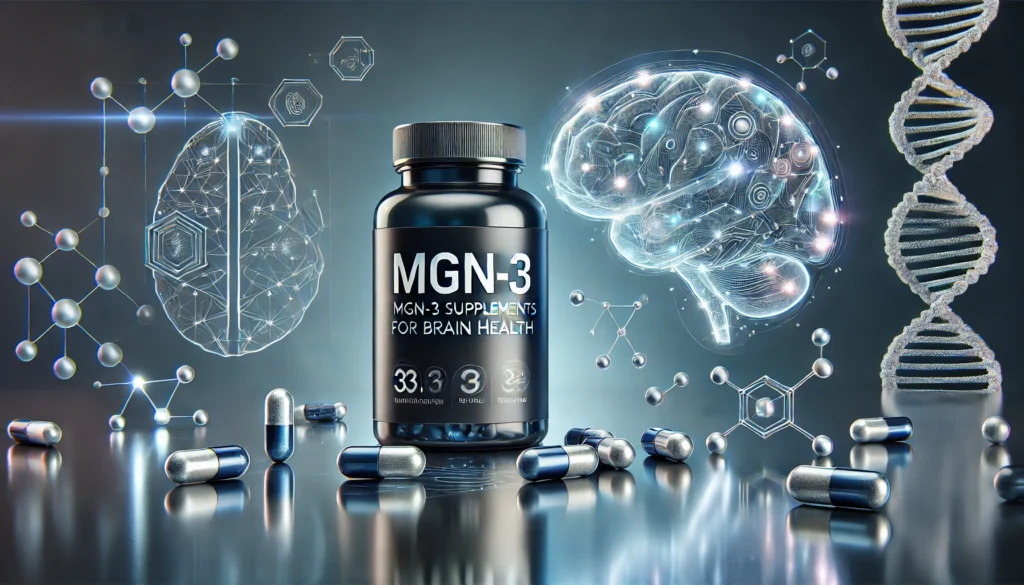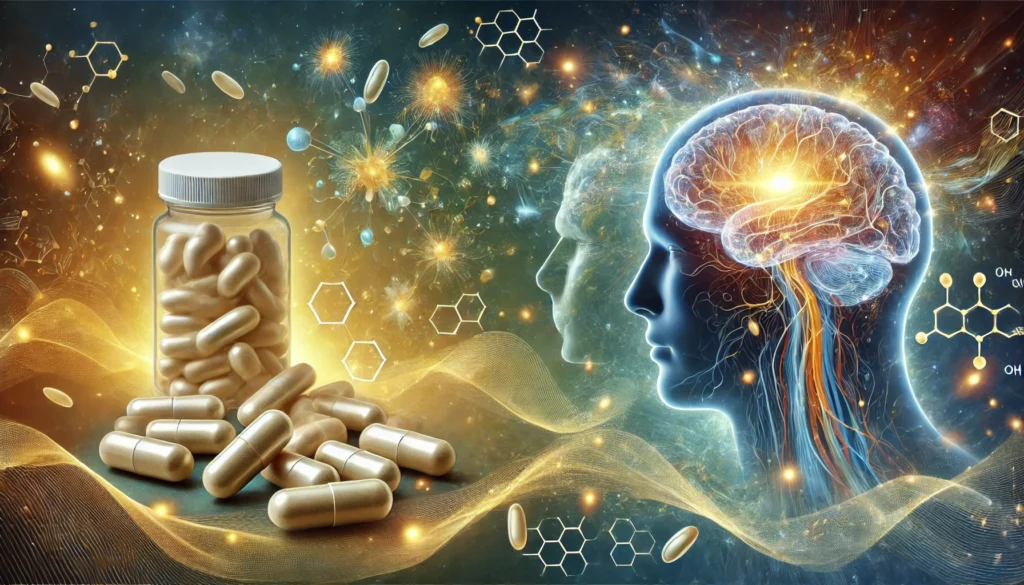Mgn-3, a patented supplement derived from the arabinogalactan compound found in the Larch tree (Larix laricina), has attracted attention in recent years for its potential health benefits. Known primarily for its immune-boosting properties, Mgn-3 is now being explored for its possible nootropic effects on cognitive function. This article provides an in-depth analysis of Mgn-3, including its chemical structure, physiological mechanisms of action, potential nootropic benefits, optimal dosage, side effects, drug interactions, and safety considerations for use as a cognitive enhancer.
You May Also Like:
Sources of Mgn-3
Mgn-3 is primarily sourced from arabinogalactan, a polysaccharide that is derived from the wood of the Larch tree (Larix laricina). Larch trees, found in temperate regions of the Northern Hemisphere, have long been valued for their ability to produce arabinogalactan, which is utilized for its immunomodulatory effects in both traditional and modern medicine. While arabinogalactan has been studied primarily for its immune-enhancing properties, recent research has extended its potential uses to cognitive health, particularly in the context of neurodegenerative diseases and mental performance.
In its supplement form, Mgn-3 is typically available as a powder or capsule, where arabinogalactan is purified to specific concentrations to ensure consistency in its bioactive content. The compound is thought to work by modulating the immune system, promoting cell regeneration, and stimulating various enzymes associated with mental function. While arabinogalactan occurs naturally in certain plants, including the Larch tree, the production of Mgn-3 as a supplement aims to optimize its therapeutic effects through careful extraction and refinement.

Chemistry of Mgn-3
Arabinogalactan, the key active compound in Mgn-3, is a complex polysaccharide consisting of galactose and arabinose sugars. These sugars are bound in a branching structure that plays a critical role in immune modulation. The molecular configuration of arabinogalactan allows it to interact with immune cells, particularly macrophages, dendritic cells, and T-cells, enhancing the body’s ability to respond to infections and other pathogens.
From a nootropic standpoint, arabinogalactan’s influence extends beyond its immune-boosting effects. This compound has been shown to stimulate the production of brain-derived neurotrophic factor (BDNF), a protein that supports neuronal survival, growth, and synaptic plasticity. BDNF is crucial for maintaining cognitive function, particularly in regions of the brain associated with memory and learning, such as the hippocampus. The stimulation of BDNF by Mgn-3 could thus promote brain health, enhance cognitive function, and potentially improve learning and memory abilities.
Physiological Mechanisms of Mgn-3 in the Body and Brain
The physiological effects of Mgn-3 are rooted in its immunomodulatory properties, though its impact on brain function is becoming increasingly well-documented. The following are the primary mechanisms through which Mgn-3 may exert its effects on both the body and brain.
Immune System Modulation
Mgn-3 has long been recognized for its immune-boosting capabilities. Arabinogalactan, the active ingredient in Mgn-3, is known to enhance the activity of various immune cells, particularly macrophages and natural killer (NK) cells, which play pivotal roles in the body’s defense against pathogens and cancerous cells. By promoting the activity of these immune cells, Mgn-3 helps the body maintain a healthy immune system, which is critical for overall well-being.
While the immune system’s primary role is to protect the body from external threats, its interaction with the brain has significant implications for cognitive health. Chronic inflammation, particularly neuroinflammation, has been linked to cognitive decline and neurological disorders. By modulating the immune system, Mgn-3 may indirectly reduce neuroinflammation, which could enhance cognitive function and protect against conditions such as Alzheimer’s disease, Parkinson’s disease, and other neurodegenerative disorders.
BDNF Stimulation
Brain-derived neurotrophic factor (BDNF) is a critical protein involved in the growth, maintenance, and plasticity of neurons. It plays a key role in long-term memory and synaptic strength. A deficiency in BDNF has been associated with cognitive decline and neurodegenerative diseases. Mgn-3 has been shown to promote the production of BDNF, potentially supporting neurogenesis (the creation of new neurons) and synaptic plasticity, which are essential for learning and memory.
In particular, Mgn-3 may help protect neurons from oxidative damage by increasing BDNF expression. This neuroprotective effect is especially relevant for aging populations, as neurodegenerative diseases are often characterized by decreased BDNF levels. By stimulating the production of BDNF, Mgn-3 could offer a natural way to enhance cognitive function and mitigate the effects of aging on brain health.
Reduction of Neuroinflammation
The brain is highly sensitive to inflammation, which, when chronic, can contribute to cognitive impairment and the progression of neurodegenerative diseases. Neuroinflammation is characterized by an overactive immune response within the central nervous system (CNS) and is often triggered by factors such as oxidative stress and the presence of toxic proteins. By enhancing the immune system’s ability to regulate inflammation, Mgn-3 may reduce the inflammation associated with cognitive decline. This mechanism could be particularly beneficial for individuals suffering from conditions such as multiple sclerosis, Alzheimer’s disease, or other inflammatory brain disorders.

Nootropic Benefits of Mgn-3
While Mgn-3 is best known for its immune-boosting properties, its effects on brain health suggest potential nootropic benefits. Nootropics are substances that enhance cognitive function, particularly in terms of memory, focus, and mental clarity. The following are some of the potential nootropic benefits of Mgn-3:
1. Improved Memory and Learning
By stimulating BDNF production, Mgn-3 may enhance memory retention and learning abilities. BDNF supports synaptic plasticity, the process by which neural connections are strengthened during learning. The increased synaptic efficiency may result in better recall, faster learning, and an overall improvement in cognitive performance.
2. Enhanced Mental Clarity and Focus
Mgn-3’s ability to reduce neuroinflammation and boost BDNF levels may contribute to better cognitive clarity and focus. Chronic inflammation in the brain has been linked to symptoms of brain fog, poor concentration, and difficulty focusing. By addressing this inflammation, Mgn-3 could help individuals experience greater mental clarity and sustained focus during mentally demanding tasks.
3. Neuroprotection and Anti-Aging Effects
One of the most significant potential benefits of Mgn-3 as a nootropic is its neuroprotective effect. By reducing neuroinflammation and stimulating BDNF production, Mgn-3 may help slow cognitive decline associated with aging. This could be especially valuable for older adults or those at risk for neurodegenerative diseases. Additionally, the anti-inflammatory properties of Mgn-3 may help protect the brain from oxidative damage, further preserving cognitive function.

Dosage and Supplementation Guidelines
As with any supplement, it is important to follow appropriate dosing guidelines to ensure safety and maximize the benefits of Mgn-3. While there are no universally established dosages for Mgn-3 as a nootropic, the following general recommendations can be used as a guideline.
1. General Dosage Recommendations
For immune-boosting purposes, typical dosages of Mgn-3 range from 300 mg to 1,000 mg per day. These doses are generally well-tolerated and are believed to provide the desired immune-modulating effects. For nootropic purposes, lower doses of around 300 mg to 500 mg per day may be sufficient to see cognitive benefits without overstimulating the immune system.
2. Optimal Timing
Mgn-3 is generally taken in capsule or powder form and can be consumed with or without food. For cognitive benefits, it may be most effective when taken in the morning, as its effects on mental clarity and focus may be most noticeable during the day. Some individuals may also find it beneficial to take a dose before engaging in mentally demanding tasks, such as studying or work, to enhance cognitive performance.
3. Safety Considerations
Mgn-3 is generally considered safe for healthy adults when taken at recommended dosages. However, individuals with certain health conditions, such as autoimmune diseases or those undergoing immunosuppressive treatments, should exercise caution when using this supplement. Since Mgn-3 modulates immune function, individuals with autoimmune conditions may experience exacerbated symptoms, and should consult with a healthcare provider before supplementation.
Side Effects and Safety
Although Mgn-3 is generally regarded as safe, it may cause mild side effects in some individuals. These side effects are typically related to the immune-modulating properties of arabinogalactan and can include:
- Digestive Disturbances: Some individuals may experience mild gastrointestinal discomfort, including bloating, gas, or diarrhea, especially when first starting the supplement.
- Allergic Reactions: While rare, some individuals may be allergic to Mgn-3 or arabinogalactan, resulting in skin rashes, itching, or swelling. Discontinue use immediately if any signs of an allergic reaction occur.
Ashwagandha promotes mental clarity and reduces brain fog—Optimize Your Mind, Order Now on Amazon!

Interactions with Other Supplements and Medications
Mgn-3 is generally considered safe when used in conjunction with other supplements. However, it may interact with medications that affect immune function, such as immunosuppressants or corticosteroids. These interactions could potentially reduce the effectiveness of the medication or enhance its side effects. As always, it is important to consult with a healthcare provider
before starting Mgn-3 supplementation, particularly for individuals on medication.
Conclusion: Should You Consider Mgn-3 as a Nootropic?
Mgn-3 offers significant potential as a nootropic supplement due to its ability to modulate the immune system, stimulate BDNF production, and reduce neuroinflammation. These actions could support cognitive function, enhance memory, and provide neuroprotective benefits, making Mgn-3 a promising candidate for individuals seeking cognitive enhancement.
While the research on Mgn-3 as a nootropic is still emerging, its immune-boosting properties and neuroprotective effects make it a supplement worth considering for brain health. However, as with any supplement, it is important to approach its use with caution and consult a healthcare professional before starting supplementation, particularly for individuals with pre-existing health conditions or those on medication.
In summary, Mgn-3 is a powerful polysaccharide that may offer cognitive benefits in addition to its well-known immune-enhancing effects. With appropriate use, it has the potential to improve mental clarity, protect against cognitive decline, and support overall brain health.

References:
- Rice Bran Arabinoxylan Compound – Uses, Side Effects, and More. Retrieved from: https://www.webmd.com/vitamins/ai/ingredientmono-271/rice-bran-arabinoxylan-compound
- Biobran/MGN-3, an Arabinoxylan Rice Bran, Exerts Anti-COVID-19 Effects and Boosts Immunity in Human Subjects. Retrieved from: https://www.mdpi.com/2072-6643/16/6/881
- Evidence-Based Review of BioBran/MGN-3 Arabinoxylan Compound as a Complementary Therapy for Conventional Cancer Treatment. Retrieved from: https://pmc.ncbi.nlm.nih.gov/articles/PMC6041933/
- Journal Article Arabinoxylan rice bran (MGN-3/Biobran) provides protection against whole-body γ-irradiation in mice via restoration of hematopoietic tissues. Retrieved from: https://academic.oup.com/jrr/article/54/3/419/974096
Important Note: The information contained in this article is for general informational purposes only, and should not be construed as health or medical advice, nor is it intended to diagnose, prevent, treat, or cure any disease or health condition. Before embarking on any diet, fitness regimen, or program of nutritional supplementation, it is advisable to consult your healthcare professional in order to determine its safety and probable efficacy in terms of your individual state of health.
Regarding Nutritional Supplements Or Other Non-Prescription Health Products: If any nutritional supplements or other non-prescription health products are mentioned in the foregoing article, any claims or statements made about them have not been evaluated by the U.S. Food and Drug Administration, and such nutritional supplements or other health products are not intended to diagnose, treat, cure, or prevent any disease.


